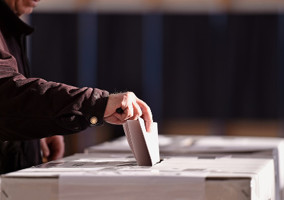Greenpeace has said charities are under a "permanent threat" from the Lobbying Act, after the Electoral Commission wrote to the charity to inform them that the regulated period came in retrospectively.
Greenpeace said it received a letter from the Electoral Commission stating that the regulated period would have started retrospectively, on 9 June 2016, even though it was a snap election.
It has now replied to say that it would take the matter to the High Court “unless the Commission reconsiders its position on what can count as regulated expenditure during the period before the snap election”.
In a blog post on its website, Greenpeace has said that the Electoral Commission has turned the Lobbying Act into a “permanent threat” to civil society campaigning by “failing to consider the special circumstances of a snap election in its guidance”.
Greenpeace received a fine from the Electoral Commission for £30,000 last month for refusing to register under the Lobbying Act at the last general election in an act of civil disobedience.
Greenpeace has said that the letter “goes as far as threatening to shut down Greenpeace’s campaign activities unless the group complies with the legislation retrospectively”.
Greenpeace UK’s executive director said: “The Commission implies that since a snap election can be called at any time, there is now no fixed start or end date to the regulated period. It’s as if the Lobbying Act and its spending cap were now permanently in force, every day of every year.
“This absurd interpretation is bound to have a significant impact on civil society as it multiplies the uncertainty and confusion already created by the Lobbying Act. If you are a fairly large campaign group or a smaller charity working in a big coalition, you’re now under permanent threat of being fined and potentially even convicted for your normal campaign activities.
“All it takes is for a snap election to be called and a campaign like Make Poverty History could be in breach of the law. There's a real risk many charities will pull out of the political debate for fear of being caught up in this bureaucratic and legal quagmire.”
The Lobbying Act requires non-party campaigners to register with the Electoral Commission if they spend more than either £20,000 campaigning in England or £10,000 campaigning in Wales.
Lobbying Act: ‘We all lose’
Bond, the umbrella body for NGOs, has been highly critical of the Lobbying Act.
It said: “We all lose if the Lobbying Act remains in its current form. The act impacts upon free speech and is hugely detrimental to the public, political parties, and the very people these organisations represent and advocate for”. It is calling on organisations to contact the organisation if it believes they have been effected by the act.
An Electoral Commission spokeswoman said: “Any individual or organisation is entitled to campaign at the general election. Rules are in place which mean that non-party campaigners that intend to spend above a certain amount must register with the Commission if their campaigning activities could be reasonably regarded as intended to influence people to vote for or against political parties or any particular category of candidates.
“We have written to a range of organisations and individuals to remind them of the law. We recognise that a retrospective regulated period can present a challenge for some campaigners, which is why we take a proportionate approach to regulation and provide advice and assistance to help ensure compliance.”
Related articles












